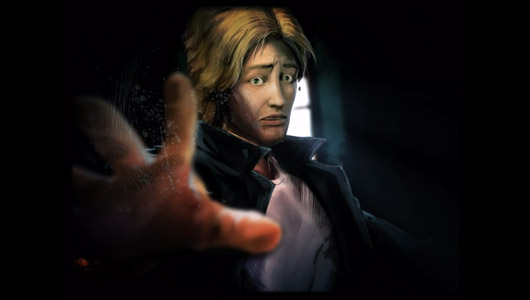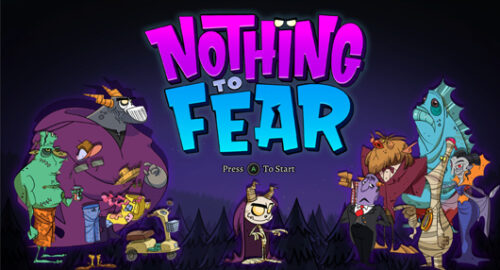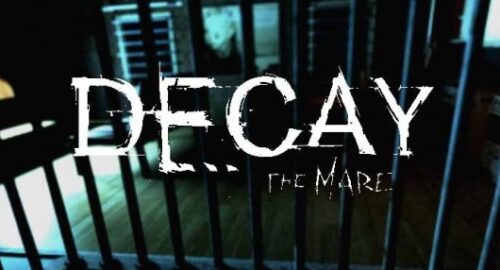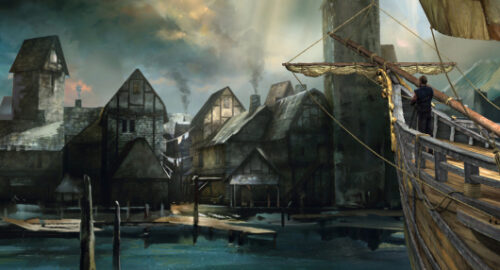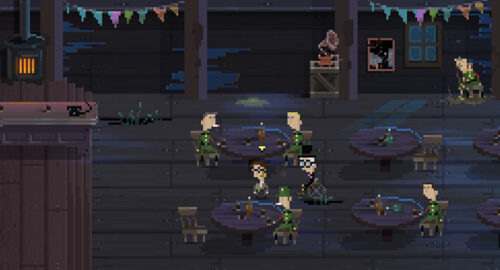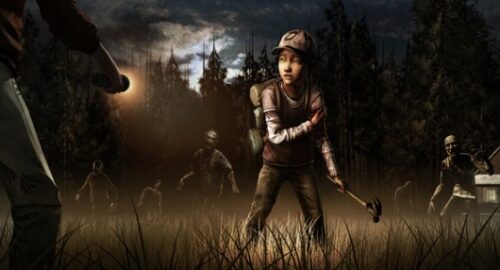Pinkerton Road made the day of many an old-time adventurer when they announced the remake of the first Gabriel Knight tale back in 2013. Sins of the Fathers marked the introduction of one of the most popular adventure gaming series. I put together a preview several weeks back looking at changes the remake brought to the demo version; and starting afresh with the full game shows the level of work put into the 20th Anniversary edition. The endgame reward, the ‘Schattenjäger Archives’, are also a great treat for long-standing fans, providing content like screenshots of original sketches, audio interviews and comparative screenshots.
• Developer: Pinkerton Road Studio & Phoenix Online Studios
• Publisher: Pinkerton Road Studio
• Reviewed on: PC
• Also Available On: Mac, iPad & Android
• Release Date: Available Now

From the opening credits Sins of the Fathers already shows fine-tuning beyond the demo, with a smart and moody layout that better matches Robert Holmes’ brilliant and evocative musical score. As mentioned in the preview, the visuals are the big win here, and the most notable updated feature. The HUD is wonderfully laid out, featuring a ‘hide’ button that allows greater exploration and better shows off the work that’s gone into reinvented areas like St. George’s Books, Jackson Square and Lake Pontchartrain. Holding down the space bar offers a shortcut to uncovering potential clues, highlighting all ‘interactable’ objects; it can be a little overwhelming.
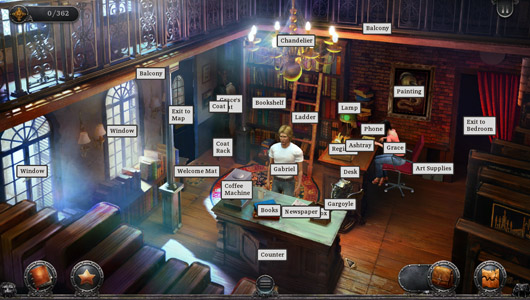
There are a lot of clickable objects here, and yes, many of which will be redundant. It’s the way of point-and-click games, yet it can make finding that useful object all the sweeter. Although, it may be a little much to provide five interactions with one object (let’s say, the wall of a tomb in St. Louis Cemetery #1 – ‘look at’, ‘use’, ‘pick up’, ‘talk’ and ‘use item’) when selecting all but one of these will merely trigger the same bemused statement that ‘the wall doesn’t work that way‘. Luckily it’s a little less frustrating now, thanks to a great hint system if you get utterly befuddled.
Sometimes it’s tempting to rely on a help system to walk you through puzzles, and I’m personally not a fan of any that are overly forgiving in this genre of game. Luckily, Sins of the Fathers have it implemented right, through the combined forces of the clue page and Gabriel’s daily log. The journal becomes such a simple yet fantastic feature that enriches a 20 year-old story. It doesn’t feel like a simple retelling of events that have happened so far – it is further insight into Gabriel’s thought processes and more importantly, humour. It’s practically helpful and even touching at points, a contribution to development of a character who requires little; he’s a swaggering womanizer who enjoys making jokes at other people’s expense (Mosely, mostly). Yet he also visits his Granny and can ask her about her knitting. He’s a bit of a caricature; an extremely likeable, unlikely hero.
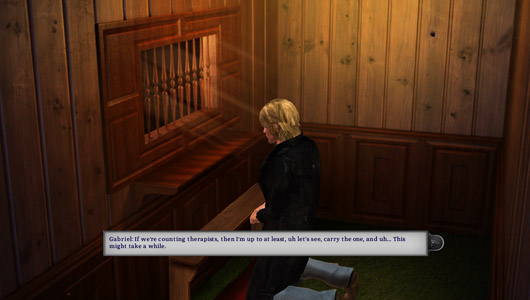
“If we’re counting therapists, then I’m up to at least, uh let’s see, carry the one, and uh.. This might take a while.”
The steps he goes through during each ‘day’ of the game, particularly reading the newspaper each morning and asking Grace if he has any messages serves to humanise him a little – yet primarily he’s still a laughably fun character to follow throughout the game. Whilst Tim Curry is the only Gabriel Knight for many, I don’t think any newcomers to the series will be at all disappointed with Jason Victor’s take.
The same can be said of the graphics – reconfiguring the environments of the game, some extremely, is a challenge that has been pulled off brilliantly. Mosely’s office is a good example – the layout and mood is deliberately altered (which is noted alongside the comparison photos in the ‘Schattenjäger Archives’) to achieve a different atmosphere from the original. Remaking this game after two decades allows Pinkerton Road to bring the visuals up to scratch with some of the more timeless elements of the game; the characters, for example.
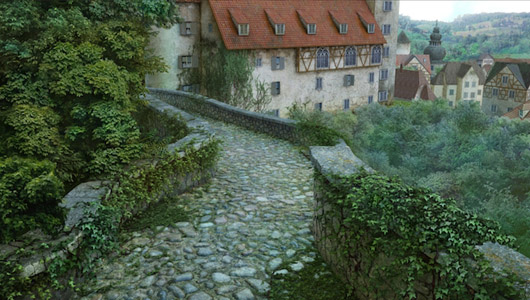
One thing I love about adventure games is the imagination their stories often encapsulate. Sins of the Fathers isn’t exactly unpredictable (especially if you’ve played it at some point in its 20 year existence..) yet it still takes the player on an exciting journey. New Orleans, Rittersberg, the Republic of Benin.. Puzzle mystery is all about location, and adventure games take you wonderfully into the unknown. It reminds me of Broken Sword – to this day I am determined to visit Prague, thanks to George and Nico’s adventure in Sleeping Dragon.
So whilst the story isn’t full of great revelations, this isn’t much of a fault when great dialogue keeps the pace moving. There’s even a Steam achievement to exhaust one character, Dr. John, on his knowledge of Voodoo – and that makes for a long conversation. If you want to, you can find out a remarkable amount about the main themes; and interestingly, that they have some grasp in reality. African voodoo, the fascinating serpent mound (although it’s in Ohio, not Africa) and the city of New Orleans are well re-imagined.
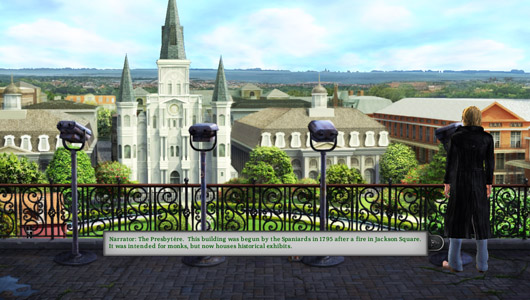
The writing is rich; the level of depth you can achieve is great. Even better, if you’re not so much interested in the plentiful information you can gain linked to the Voodoo Murders, you’re welcome to spend a lengthy period shooting various insults at Mosely, or compliments to Gran. There’s so much to talk about if you’re Gabriel Knight, and luckily it’s well written and interjected with wit at every turn. (Conversing with Officer Frick, in particular, is a sure experience.)
Modern adventure games often seem to try and make up for ‘light’ gameplay – big successes in the genre often have a focus on the emotive highs in the narrative. The Walking Dead is a clear example of this. However, this remake proves that adventure games aren’t dated, and can still be appreciated for what they were twenty years ago. Even at the game’s climax as Gabriel and Mosely have to rescue a friend from the Voodoo ritual, light-hearted humour always has a presence. Some could say it cheapens the experience, as the story meets a partly tragic end, and could benefit from a stronger sense of emotional poignancy. This is especially true when considering the brilliant role Holmes’ soundtrack plays; it’s the clearest expression of each scene’s tone, particularly the dramatic final showdown. It is a slight shame that this build up doesn’t occur across all elements of the game, but then again, the unexpected bouts of witty humour even in darker scenes is what is most memorable about Gabriel Knight. With all of the work that’s gone into this remake, it’s great to see the best of its original charm hasn’t been lost.
